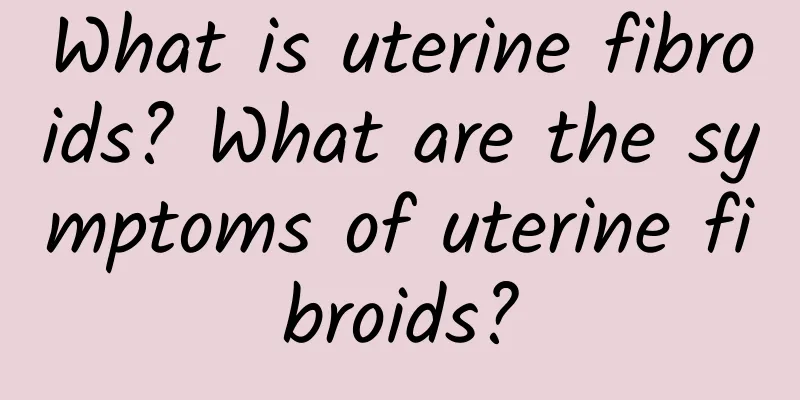What is uterine fibroids? What are the symptoms of uterine fibroids?

|
Many female friends find that they have uterine fibroids during routine physical examinations. They don’t know what uterine fibroids are, so they have a lot of fear and anxiety. Some even go to the doctor, which delays the treatment of the disease. So, what are uterine fibroids? What are the symptoms? Doctors specializing in uterine fibroids say that although uterine fibroids are a benign tumor, the specific cause is still unclear. Studies have shown that excessive hormone secretion is the most common cause of uterine fibroids. So what are uterine fibroids? According to authoritative experts, uterine fibroids, also known as uterine leiomyoma, are mostly asymptomatic, with a few showing vaginal bleeding, abdominal contact with the tumor and compression symptoms. If the pedicle is twisted or other conditions occur, it will cause pain. Multiple uterine fibroids are very common. The clinical manifestations of uterine fibroids often vary with the location, size, growth rate, whether there is secondary degeneration and complications of the fibroids. Common clinical phenomena are uterine bleeding, abdominal masses, pain, symptoms of proximity of adjacent organs, increased leucorrhea, infertility, anemia and heart dysfunction. Many patients do not have any physical abnormalities in the early stages, and some patients find that they have uterine fibroids during pelvic examinations. Of course, if there are symptoms, it is related to the location of the fibroids, fibroid degeneration and production speed. The more common symptoms of uterine fibroids are: 1. Abdominal mass: abdominal distension, lower abdominal swelling, accompanied by a feeling of falling. 2. Menstrual changes: The most common symptoms are shortened menstrual cycle, increased menstrual volume, prolonged menstruation, irregular vaginal bleeding, etc. 3. Pain: Generally, patients do not have abdominal pain, but often have lower abdominal distension, back pain, etc. 4. Increased leucorrhea: Increased leucorrhea, sometimes with a large amount of purulent and bloody discharge and necrotic tissue. |
<<: Do most uterine fibroids have no symptoms? Is vaginal bleeding a symptom of uterine fibroids?
>>: What are uterine fibroids? Can uterine fibroids cause vaginal bleeding?
Recommend
How to treat mild to moderate cervical erosion in women? Chinese medicine treatment for mild to moderate cervical erosion
I believe many female friends must have heard of ...
Can cervical erosion develop into cervical cancer?
"Cervical erosion" troubles many female...
Which regular hospital should I go to for threatened abortion examination?
Many pregnant women experience threatened miscarr...
How to regulate irregular menstruation most effectively
There is no such thing as the most effective way ...
Can uterine effusion be treated with medicine?
Accountants, office clerks, editors, computer ope...
Gained weight during the Chinese New Year? 2 great fat-reducing saviors to easily manage body fat
What to do during the Chinese New Year? Of course...
Does left lateral adnexitis affect pregnancy?
Left-sided adnexitis may affect pregnancy and nee...
Taoyuan County to expand inspections for 6 weeks as Clenbuterol scandal spreads
Due to the ongoing controversy over clenbuterol, ...
The difference between vulvar itching and vulvar leukoplakia
The difference between vulvar itching and vulvar ...
Overeating due to stress will make you gain more weight! Nutritionist: 5 tips to avoid emotional eating and avoid obesity
Faced with the epidemic and the high pressure of ...
What are the symptoms of cervicitis and cervical hypertrophy
Symptoms of cervicitis and cervical hypertrophy i...
Can adding appropriate amount of peanuts to dishes help you lose weight more efficiently? 3 Steps to Homemade Chicken Breast Stir-Fried Peanuts
This fragrant and filling chicken dish is stir-fr...
Is it okay to have an IUD for patients with adenomyosis?
Is it good for patients with adenomyosis to have ...
What is adnexitis?
Adnexitis may cause symptoms such as lower abdomi...
Insufficient protein leads to decreased immunity. Are you eating in the right order? Nutritionist: Plant-based protein is less burdensome, let’s compare plant-based milk
Do you feel inexplicably fat during the epidemic?...









